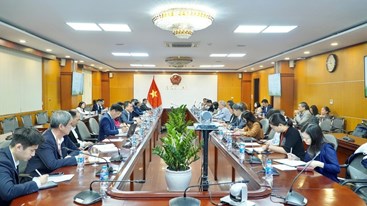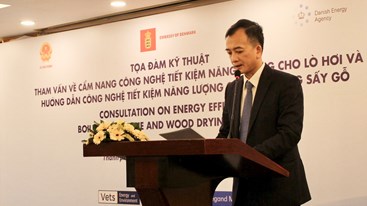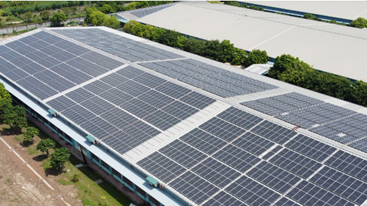Sunday, 28/04/2024 | 22:20 GMT+7
As the United Nations Climate Change Conference in Cancun,
Mexico wraps up its final day, discussions continue over some crucial issues
such as the need to simultaneously reduce global greenhouse gas emissions and
provide the world with more energy. While no one expects major progress
towards a comprehensive binding treaty, Mexican officials say they do see
progress in some areas and that the conference is providing an opportunity for
many governments and environmental organizations to share ideas and forge
agreements of their own.
While delegates from over 190 nations meet under tight security at a nearby
hotel, representatives of non-governmental organizations, universities,
regional groups and other entities come together at a large conference hall to
move ahead with their own agendas. One focal point discussed here over the past
two weeks involves how industrialized nations can help developing countries not
only adapt to climate change, but gain access to more energy in order to grow
their economies.
Scientists from richer nations say increased emissions of greenhouse gases from
burning fossil fuels like coal and petroleum products are causing the earth to
warm. But how can poor nations reduce emissions when the only way out of
poverty is to increase energy use?

Speaking in a forum on sustainable development, Brian Dames, Chief Executive of South Africa's public utility ESKOM, noted that his continent lags far behind in access to electrical power.
"If you look at the continent at night from a satellite it is truly the
dark continent and therein lies the challenge that we have," said Dames.
Dames notes that energy access in sub-Saharan Africa is about 25 percent versus
90 percent in east Asia, yet Africans pay nearly double the price for energy.
He and other development experts say electrical energy is the key to fighting
poverty in poor nations.
The United Nations has addressed this need through its Global Campaign for
Universal Energy Access, which has an emphasis on the use of clean energy.
Technologies already available may help poor regions operate local electrical
grids and utilize waste products in their own vicinity for fuel.
Helge Marie Norheim, a vice president of Norway's state-owned oil company
Statoil, says her company is working on projects in Africa to use biofuels to
supplement energy from other sources.
"Energy companies like Statoil have the technology, competence and
financial capability to continue to provide for energy security, while, at the
same time, addressing the dual challenge of climate change," said Norheim.
Kandeh Yumkella, Director General of the U.N. Industrial Development
Organization and a citizen of Sierra Leone, says expanding electrical power
resources in Africa would add minimal amounts of greenhouse gas emissions to
the atmosphere. But, he says, his organization favors using clean energy.
"The knowledge for solar, wind, hydro, biofuel mass- these are
known. So we can even use new renewable technologies that are existing
today and their contributions to emissions will be negligible," said
Yumkella.
Much of the talk at this conference has been about transferring wealth from
richer nations to poorer ones to help them both mitigate their emissions and adapt
to the changes that global warming will produce. To have better energy systems,
Yumkella says developing nations need not only money, but technical assistance.
"There is a lot of need for external assistance from the United States,
from Europe, and others, for support," added Yumkella. "Also,
there are lots of possibilities for South-South cooperation. China and India,
they have developed indigenous technologies to use biomass, to use animal
waste, to be able to provide basic energy services for the poor."
The climate conference is winding down, but many of the projects discussed here
are only getting started. Participants in the many forums that have taken place
here say they are committed to doing their part to save the planet and their
own communities, regardless of what does or does not happen on a larger scale.
voanews.com








.jpg?w=367&h=206&mode=crop) Energy efficiency and conservation usage is an important aspect of the national energy development strategy
05/03/2024
Energy efficiency and conservation usage is an important aspect of the national energy development strategy
05/03/2024
 Challenges and Opportunities to promote energy efficiency market in Vietnam
Challenges and Opportunities to promote energy efficiency market in Vietnam
 The Ministry of Industry and Trade requests government agencies to coordinate in organizing Earth Hour 2024
The Ministry of Industry and Trade requests government agencies to coordinate in organizing Earth Hour 2024
 Consultation on Energy Efficiency Boiler Catalogue and Wood Drying Guideline
Consultation on Energy Efficiency Boiler Catalogue and Wood Drying Guideline
 Son Ha Co., Ltd, applies energy efficiency and conservation measures
Son Ha Co., Ltd, applies energy efficiency and conservation measures
.png?w=367&h=206&mode=crop) Request for expression of interest - C2.1.13: Capacity Building on energy efficiency policies development
Request for expression of interest - C2.1.13: Capacity Building on energy efficiency policies development
 Phuc Kien Co., Ltd., is effectively implementing energy-saving measures
Phuc Kien Co., Ltd., is effectively implementing energy-saving measures
 Request for expression of interest - C2.1.12: Independent monitoring of safeguards implementation
Request for expression of interest - C2.1.12: Independent monitoring of safeguards implementation